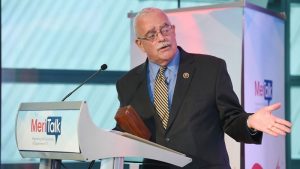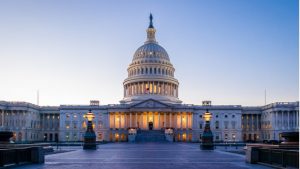Rep. Gerry Connolly, D-Va. – long a prime mover in Congress for improving Federal IT operations – said at MeriTalk’s State Tech Vision virtual program on September 15 that he plans to push two key pieces of legislation this year that aim to help state and local governments improve their own IT capabilities.
Crumbling bridges and leaky levees. Buckling roadways. Unsafe water pipes. Inadequate public transit. The list of U.S. infrastructure failings is both broad and deep. The United States is paying only about half of its necessary infrastructure bill, and the total investment gap has grown from $2.1 trillion over 10 years, to a current figure of nearly $2.59 trillion over 10 years, according to the American Society of Civil Engineers. As a result, local government leaders face staggering infrastructure requirements that local tax revenues cannot fulfill.
Infrastructure week finally arrived in Washington, D.C. with the Senate’s approval of the $1 trillion Infrastructure Investment and Jobs Act on Tuesday morning. The bill – whose main tech-related titles include $65 billion for broadband and around $2 billion for cybersecurity – cleared the Senate by a vote of 69-30.
Following a pair of votes on the Infrastructure Investment and Jobs Act over the weekend, the bipartisan infrastructure measure is nearing the finish line in the Senate. The bill is currently on track for a final vote in the Senate on Tuesday morning.
A bipartisan bill introduced by Sens. Brian Schatz, D-Hawaii, Thom Tillis, R-N.C., John Cornyn, R-Texas, and Richard Blumenthal, D-Conn., seeks to improve cybercrime data collection and give Federal law enforcement more tools to stop online crime.
Sens. Mark Warner, D-Va., and Tom Cotton, R-Ark., have introduced the American Telecommunications Security Act that would prohibit Federal funding from the American Rescue Plan Act from being used to purchase telecommunications equipment from Chinese companies seen as national security threats, including Huawei and ZTE.
New bicameral legislation was introduced July 22 by various members of the House and Senate that would provide $40 billion over five years to extend the Federal Communications Commission’s (FCC) Emergency Connectivity Fund that was created under the American Rescue Plan Act of 2021.
New legislation introduced in the Senate today would authorize $100 million of Federal spending per year, for a period of seven years, to help state and local governments take quick action on fixing pressing IT problems.
Representatives on the House Homeland Security Committee reintroduced legislation May 12 that would create a $500 million-per-year Department of Homeland Security (DHS) grant program to help incentivize state and local governments (SLGs) to improve cybersecurity funding.
A bipartisan group of senators has reintroduced the Rural STEM Education Act, which would provide Federal support for STEM training in rural schools and instruct the director of the National Science Foundation (NSF) to provide grants to support training for rural STEM teachers.














